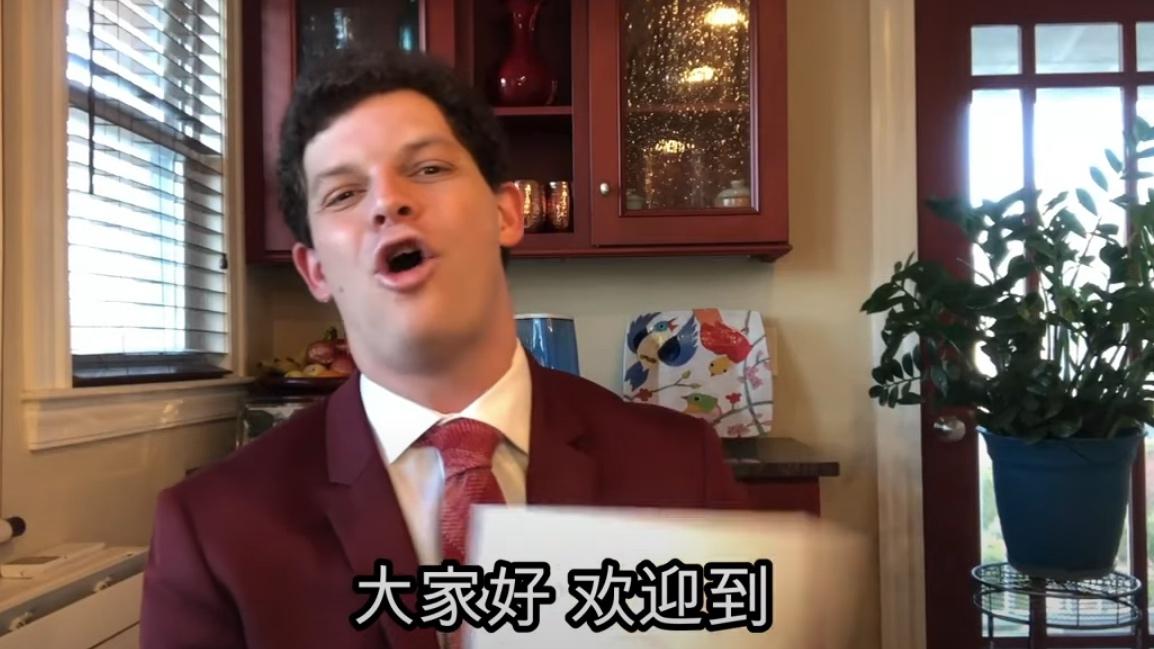Dressed in a suit and tie, American comedian Jesse Appell broadcasts a comedy show from his parent’s kitchen in Boston to his audience of more than 2 million viewers across China and the world.
Appell moved to China seven years ago to study Chinese comedy and became a standup comedian in Beijing, but the pandemic landed him back in Boston, where he’d gone to visit family in February and then got stuck.
Related: Chinese reactions to Trump and Biden are mixed
He created the “Jesse@Home Show” as a way to continue his work from afar. Now, he looks for laughs by scrolling through the online comments posted by viewers.
Appell’s comedy is part of a long history of cultural diplomacy between the US and China.
His latest episode is about the upcoming US elections. He uses humor to explain American politics. For instance, what’s up with Biden’s sunglasses?
Fans in China tune in for a laugh, and also to learn about the US from an American’s perspective, something they rarely get in China.
Last year, China and the US celebrated 40 years of diplomatic relations. This year, their relationship has been severely tested. Amid the pandemic and rising tensions, cultural diplomacy projects between the two countries have suffered.
Related: ‘You can’t just break up’: US-China tensions add stress for binational couples
“So, this is about the only applause I get nowadays as a comedian is just waiting for the little ‘haha’ comments to come across the screen at the right time,” Appell said.
Appell loves to make people laugh, but he’s serious about the work he does to translate American culture for a Chinese audience, even if it has to be online.
“It’s easy to forget that most Americans will never go to China and most Chinese will never go to America. So if we’re going to do successful people to people relations, it basically has to be on the internet.”
“It’s easy to forget that most Americans will never go to China, and most Chinese will never go to America. So, if we’re going to do successful people-to-people relations, it basically has to be on the internet,” he said.
Musical performances, art exchanges and sports competitions have all helped to strengthen the relationship between the two countries since the early 1970s. Pingpong matches between China and the US paved the way for President Richard Nixon’s historic visit to China, and the normalization of relations between the two countries.
Related: K-pop and Chinese hip-hop artists grapple with their responses to BLM
“Some people say we build a bridge, but actually, we also make sure that people come across the bridge, so that kind of emotional involvement [is] through the arts.”
Mengtong Guan, the executive director at Ping Pong Arts, a nonprofit based in the US and China that organizes artistic exchange programs, explained, “Some people say we build a bridge, but actually, we also make sure that people come across the bridge, so, that kind of emotional involvement through the arts.”
“Art is almost the glue, it’s almost the backdrop to allow government officials to get in the same room together.”
Terry Harvey, vice president for cultural diplomacy at the Meridian International Center in Washington, DC, agrees.
“Art is almost the glue, it’s almost the backdrop to allow government officials to get in the same room together,” he said. “And it may just kind of start a little bit of a dialogue that may then result in something bigger later.”
Each year, the US government allocates millions of dollars to cultural diplomacy programs, like writer exchanges and hip-hop workshops. But the pandemic has made those projects almost impossible to pull off.
Harvey says that events his group planned with the Chinese Embassy had to be canceled this year. Rising political tensions was definitely a factor. Still, he’s optimistic about the future.
“I know that as soon as the tide turns in a positive fashion, we’re working together immediately,” he said. “I mean, it’s kind of a way to kind of get things started again.”
He sees performers like Appell as crucial to rebuilding relationships between countries that aren’t getting along.
“In a lot of ways, they are the front-line workers of cultural diplomacy,” he said.
Appell agrees.
“The work that I’m doing is more valuable in a world where we’re fighting. The problem is, it’s just much harder to make a living doing it,” he said.
Appell feels an obligation to keep doing the work, even while he’s stuck in his parents’ home in Boston. He knows there’s value in his comedy. Plus, he says, it’s a lot of fun.
We want to hear your feedback so we can keep improving our website, theworld.org. Please fill out this quick survey and let us know your thoughts (your answers will be anonymous). Thanks for your time!
